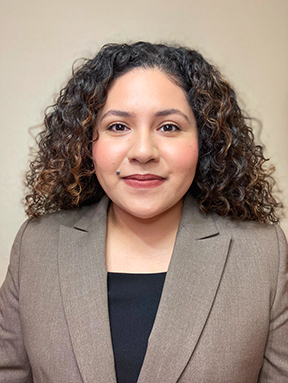
Karen Angeles, a child of Mexican immigrants, grew up watching her father, a self-employed mason, use the power of civil infrastructure to build a life for his family. Now a doctoral candidate at the University of Notre Dame, Angeles credits her early exposure to his work with sparking her interest in structural engineering. Combining this field of study with her intrigue in the modern open data landscape, Angeles’ doctoral research focuses on the development of data-driven workflows that advance the capacity for at-risk communities to prepare for and recover from large-scale and devastating disasters such as hurricanes.
Angeles found her way to Notre Dame through a Summer Research Opportunities Program, an experience that she credits as further refining her passion for human-centered structural engineering. Awarded a Deans’ Fellowship, and later winning a highly competitive National Science Foundation Graduate Research Fellowship, Angeles notes that with the urging of Nyrée McDonald, associate dean of graduate enrollment management, she applied for and gained access to one of the most transformative elements of her graduate training experience, the GEM Consortium.
Funded by partnerships with nearly 200 member institutions including top research universities, national labs and research-intensive corporations, the GEM Consortium, a nonprofit founded at the University of Notre Dame in 1976, is the premier organization that supports, through fellowships, highly qualified students from underrepresented communities who are pursuing graduate degrees in applied science and engineering.
The GEM consortium has “built a legacy of scientific impact and reinforced a narrative of Black and Brown excellence in STEM,” in the words of Brannon Marcano, the organization’s CEO. As he envisions the future of GEM, it is essential that the consortium continue to “play a major role in not only establishing true diversity in STEM, but also fostering creativity, innovation and, ultimately, scientific impact.”
McDonald cites GEM as a key partner and source of inspiration for Notre Dame to achieve its goals in recruiting and sustaining top graduate students from groups historically underrepresented in science, technology, engineering and mathematics (STEM). She notes that “each undergraduate student I speak to about applying to graduate school and each student who I mentor as they navigate their master’s or doctoral program understand that earning an advanced degree is critical for those aspiring to positions of influence in academia, industry or government. With partners across the GEM Consortium, I have tremendous confidence that Notre Dame is highly engaged in critical efforts to help the most promising students achieve their full potential.”
Angeles, who is mentored by Tracy Kijewski-Correa in the Department of Civil and Environmental Engineering and Earth Sciences, draws direct links between her research and its broader impacts in supporting a more resilient, sustainable future. “The interdisciplinary nature of my projects throughout my doctoral studies has helped me devise a unique skill set that enables me to navigate and integrate the worlds of hazard risk assessment and mitigation, data science and sustainable building design. These projects push disciplinary boundaries and reinforce my ability to use data for the benefit of society.” Such work exemplifies the Graduate School’s foundational commitment to students conducting research that matters.
Emphasizing the value of the GEM Consortium network as part of her graduate experience at Notre Dame, Angeles notes that for first-generation scholars like herself, “the organization cultivates a professional community for a diverse group of individuals who are committed to driving excellence and representation both in their chosen disciplines and in the broader impacts of their work.”
Originally published by at graduateschool.nd.edu on Jan. 24.